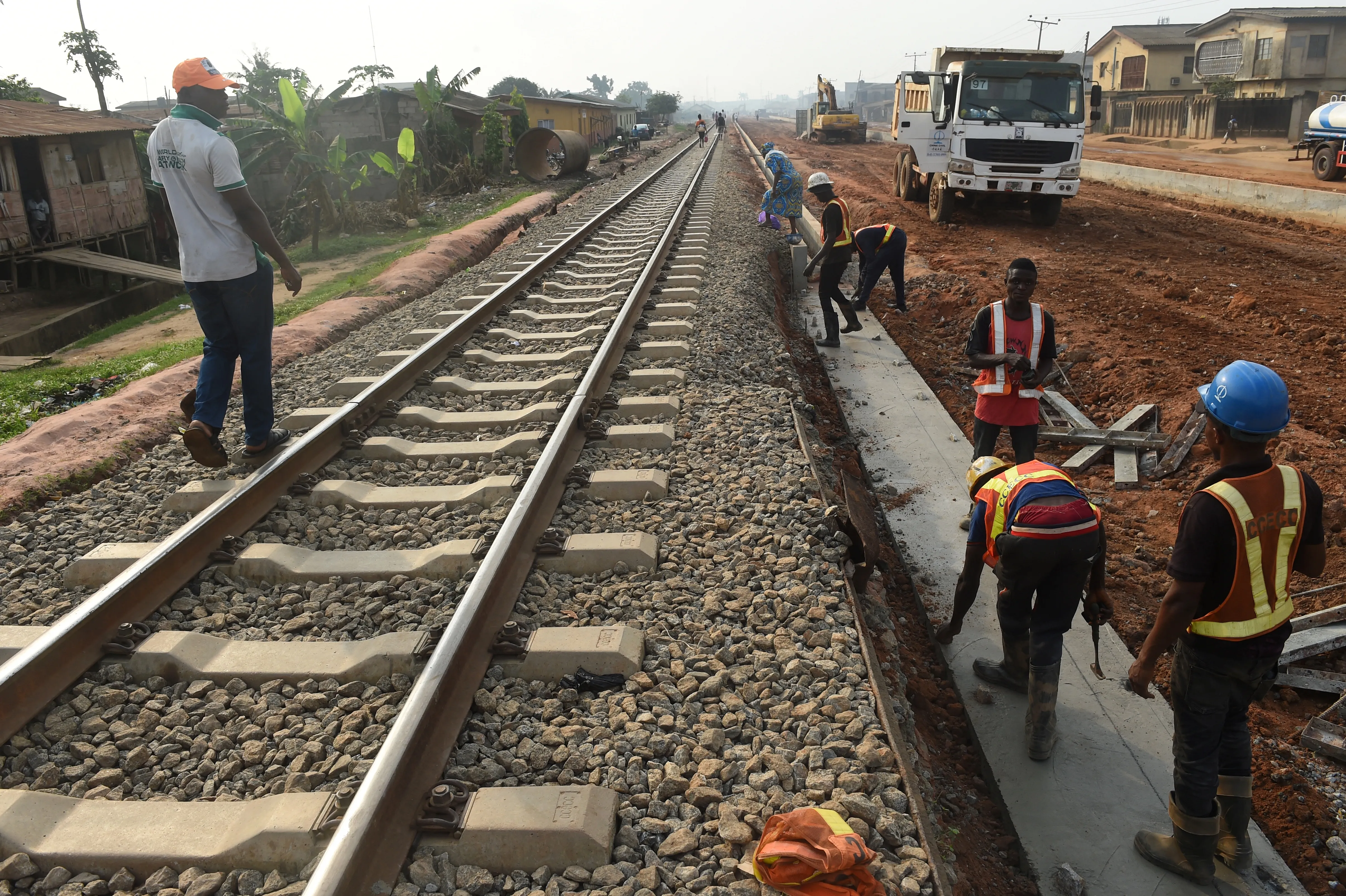Nigeria has multibillion dollar plans to address its entrenched infrastructure deficit, with megaprojects across the country in various stages of development seeing a new influx of capital.
Rail, road and airport projects stretching across Nigeria are either well advanced, recently signed off or just breaking ground in the wake of an infrastructure drive by the administration of President Muhammadu Buhari.
The government is not only focusing on new infrastructure but on the rehabilitation of existing assets and the completion of longstanding projects that have failed to gain traction under previous governments, including the infamous 3,050 MW Mambilla hydropower project, stalled for more than 40 years despite significant budgetary allocations for it over decades.
| Nigeria’s megaprojects |
|---|
| The 156km Lagos-Ibadan Standard Gauge Railway with an extension to Lagos Port, funded by the Export-Import Bank of China and now nearing completion. |
| The 614km Ajaokuta-Kaduna-Kano Gas Pipeline, co-funded by China (85%) and the Nigerian National Petroleum Corporation (15%), signed off by President Buhari in mid-2020. |
| The Lekki Deep Sea Port outside Lagos serving free zones along the coast, co-owned by the China Harbour Engineering Company, Tolaram Group, the Lagos State Government and the Nigerian Ports Authority. |
| The 35km Apapa-Oshodi-Oworonshoki Expressway to link the port to the Lagos-Ibadan Expressway, being driven by the Dangote Group. |
| The construction of four new international airport terminals in Lagos, Abuja, Port Harcourt and Kano. |
There have been many initiatives to drive infrastructure development, with varying levels of success. Buhari’s latest initiative, announced in February, is the establishment of the Infrastructure Corporation of Nigeria (InfraCo), which aims to raise $36.7bn for projects and will be driven by some of the country’s top institutions.
InfraCo’s seed capital of N1 trillion (about $2.6bn) will come from the Central Bank of Nigeria, the Nigerian Sovereign Investment Agency (NSIA) and the Africa Finance Corporation (AFC), a Nigeria-based multilateral financial institution.
InfraCo’s mandate is to finance public asset development, rehabilitate old assets and construct new ones. It will be chaired by the CBN governor with the managing director of NSIA, the president of AFC, and representatives of the Nigerian Governors Forum and Ministry of Finance on its board.
Vice-President Yemi Osinbajo will head a committee charged with getting the company started, and the government is expected to hire an asset manager to independently manage InfraCo’s capital-raising plan. While the private sector will have three board positions, concerns have been expressed about excessive government interference.
“With the heavy leaning of the new firm to public sector control, the question and challenge is how to protect it from government and political pressures,” says Nigerian economist Franklin Ngwu.
Overcoming delays
Another major initiative is the Presidential Infrastructure Development Fund (PIDF), launched in 2020 to invest specifically in road and power projects and managed by the NSIA.
It aims to drive the completion of several large projects that have been plagued by delays, such as the Mambilla hydropower project, the 11.9km second Niger Bridge – now scheduled to be completed in 2022 – and the 130km Lagos to Ibadan Expressway. In all, there are currently around 600 road construction and repair projects underway across the country.
Elsewhere, trade routes are being opened up, with construction commenced on a $2bn railway line connecting northern Nigeria to neighbouring Niger and $3bn earmarked for the rehabilitation of a 1,400km line linking Port Harcourt with Maiduguri in the far northeast. The government has also contracted German multinational Siemens to rehabilitate and expand the power grid under the Presidential Power Initiative, which is targeting 25,000 MW of electricity by 2025, up from the current installed capacity of around 12,500 MW.
Extra financing is being made available. Although Buhari’s request to the legislature in 2016 for approval to borrow $30bn from external creditors to finance infrastructure was refused, a renewed bid for a $22.7bn loan was approved last year. The government approached the Export-Import Bank of China for $17bn, with the remainder to come from the World Bank, Islamic Development Bank, African Development Bank and others.
“This will be a decade of infrastructure expansion for Nigeria.”
Continuing deficit
Nigeria’s infrastructure deficit has been one of the biggest factors holding back growth and development. Last November, Moody’s Investors Service estimated that the country’s financing shortfall for infrastructure will be a staggering $3 trillion over the next 30 years.
But the problems go beyond funding. Billions of dollars have been sunk into infrastructure projects that have failed to see the light of day or have been abandoned after construction has started as a result of weak institutions, lack of accountability and limited policy consistency across different administrations. The situation is compounded by graft and the limited maintenance of existing infrastructure.
In addition, a rapidly growing population is putting added strain on the already inadequate infrastructure stock, said Kunal Govindia, vice-president and senior analyst at Moody’s Investor Service, at the time the consultancy released its estimate.
The value of Nigeria’s total infrastructure stock represents only 35% of GDP, significantly below that of South Africa (87% of GDP), and the emerging economy average of 70%, according to the country’s Debt Management Office.
The World Economic Forum’s 2019 Global Competitiveness Index ranked Nigeria 116 out of 141 countries, largely due to the poor state of its infrastructure. The situation is dire in most cities but worse in rural areas where more than half of Nigeria’s population resides.
Buhari’s infrastructure rollout has not been without its critics. Questions have been raised about the dominance of construction firm Julius Berger in projects and the extensive involvement of China. Nigeria owed China about $3.1bn before the new loan, more than 10% of the country’s total external debt stock of $27.6bn, but, as pointed out by the Debt Management Office, less than 4% of Nigeria’s total public debt.
Buhari has also been accused of prioritising development in the north of the country, where he hails from. But transport minister Rotimi Amaechi, from the Niger Delta in the south, has pointed to significant projects in Rivers State, Lagos and other parts of the south.
Franklin Ngwu says the government must learn lessons from the failure of previous infrastructure finance initiatives such as the Infrastructure Bank of Nigeria. Dr Bongo Adi of Lagos Business School’s Centre for Infrastructure, Policy, Regulation and Advancement says that reforming contract regulations will be essential to give investors certainty.
“One of our biggest problems is the inability to respect contracts. This is a result of the nature of our government, the nature of our institutions and our habits. It makes investors wary of putting resources into such an environment.”
Want to continue reading? Subscribe today.
You've read all your free articles for this month! Subscribe now to enjoy full access to our content.
Digital Monthly
£8.00 / month
Receive full unlimited access to our articles, opinions, podcasts and more.
Digital Yearly
£70.00 / year
Our best value offer - save £26 and gain access to all of our digital content for an entire year!
 Sign in with Google
Sign in with Google 



